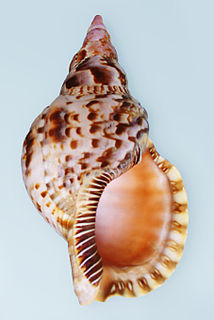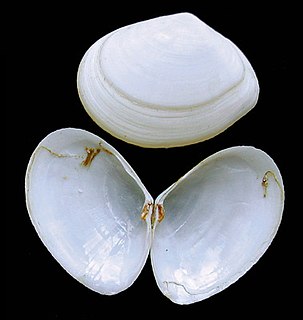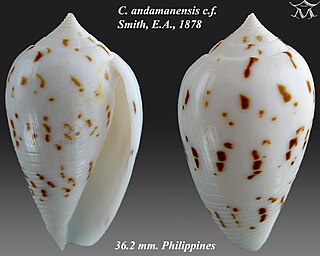
Charonia is a genus of very large sea snail, commonly known as Triton's trumpet or Triton snail. They are marine gastropod mollusks in the monotypic family Charoniidae.

Xenophora, commonly called carrier shells, is a genus of medium-sized to large sea snails, marine gastropod mollusks in the family Xenophoridae, the carrier snails or carrier shells. The genus Xenophora is the type genus of the family Xenophoridae.
Laternulidae, common name lantern clams, is a family of saltwater clams, marine bivalve molluscs in the order Anomalodesmata.

A bivalve shell is part of the body, the exoskeleton or shell, of a bivalve mollusk. In life, the shell of this class of mollusks is composed of two hinged parts or valves. Bivalves are very common in essentially all aquatic locales, including saltwater, brackish water, and freshwater. The shells of bivalves commonly wash up on beaches and along the edges of lakes, rivers, and streams. Bivalves by definition possess two shells or valves, a "right valve" and a "left valve", that are joined by a ligament. The two valves usually articulate with one another using structures known as "teeth" which are situated along the hinge line. In many bivalve shells, the two valves are symmetrical along the hinge line—when truly symmetrical, such an animal is said to be equivalved; if the valves vary from each other in size or shape, inequivalved. If symmetrical front-to-back, the valves are said to be equilateral, and are otherwise considered inequilateral.

Mya truncata, common name the blunt gaper or truncate softshell, is a species of edible saltwater clam, a marine bivalve mollusk in the family Myidae.

Cymatium is a genus of small to large predatory sea snails, marine gastropod mollusks in the family Cymatiidae.

Hexaplex cichoreum, common name the "endive murex", is a medium-sized species of sea snail, a marine gastropod mollusk in the family Muricidae, the murex shells or rock snails.
Spirotropis ephamilla is a species of sea snail, a marine gastropod mollusk in the family Drilliidae.

Tectus is a genus of sea snails, marine gastropod mollusks in the family Tegulidae.

Fabulina fabula, the bean-like tellin, is a species of marine bivalve mollusc in the family Tellinidae. It is found off the coasts of northwest Europe, where it lives buried in sandy sediments.

Lutraria lutraria is a species of large marine bivalve mollusc in the family Mactridae. Its common names include the otter shell and the common otter shell. It occurs in coastal regions of the north east Atlantic Ocean where it lives buried in the sand.

Venerupis is a genus of marine bivalve molluscs in the family Veneridae commonly known as carpet shells. The valves are robust and rhomboidal with the umbones turned-in and nearer the anterior end. The posterior end is wedge-shaped and the internal margins of the valves are smooth. There are 3 or 4 cardinal teeth on each valve. The foot is large and the siphons are of medium length and united except at the very tip.

Calibanus is a subgenus of sea snails, cone snails, marine gastropod mollusks in the genus Conus, family Conidae, the cone snails and their allies.

Darioconus is a subgenus of sea snails, marine gastropod mollusks in the genus Conus, family Conidae, the cone snails and their allies.

Lamniconus is a subgenus of sea snails, marine gastropod mollusks in the family Conidae, the cone snails and their allies.

Lautoconus is a subgenus of sea snails, marine gastropod mollusks in the genus Conus, family Conidae, the cone snails and their allies.

Leporiconus is a subgenus of sea snails, marine gastropod mollusks in the genus Conus, family Conidae, the cone snails and their allies.

Leptoconus is a subgenus of sea snails, marine gastropod mollusks in the genus Conus, family Conidae, the cone snails and their allies.

Monteiroconus is a subgenus of sea snails, marine gastropod mollusks in the genus Conus, family Conidae, the cone snails and their allies.

Phasmoconus is a subgenus of sea snails, marine gastropod mollusks in the genus Conus, family Conidae, the cone snails and their allies.



















